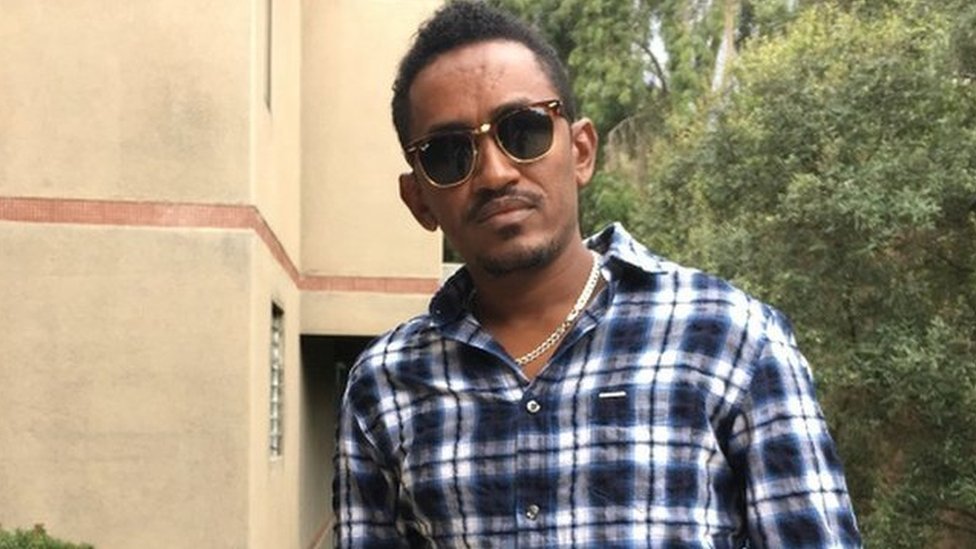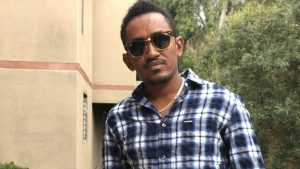Ethnic unrest in the aftermath of the killing of Ethiopian singer Hachalu Hundessa has left at least 166 people dead, officials say. A top police chief said 145 civilians and 11 security personnel died in Oromia region alone. Ten people have been killed in the capital Addis Ababa.
Hachalu, 34, was killed on Monday, sparking unrest that spread from Oromia where he was seen as a hero.
The motive remains unclear. Hachalu had said he had received death threats.
His songs focused on the rights of the country’s Oromo people, Ethiopia’s largest ethnic group, and became anthems in a wave of protests that led to the downfall of the previous prime minister in 2018.
BBC Ethiopia reporter Kalkidan Yibeltal says ethnic and religious tensions have intensified in the aftermath of the killing.
Announcing the latest figures, Oromia deputy police commissioner Girma Gelam said 167 had “sustained serious injuries” during the unrest.
Mr Gelam said 1,084 people had been arrested, without providing further detail.
In his statement, the police official said the violent unrest had now “completely stopped”.
Prime Minister Abiy Ahmed, himself an Oromo, who came to power in April 2018, has warned that those behind Hachalu’s death wanted to derail his reform programme.
“We have two choices as a people. To fall into the trap being set up by detractors or to deviate from their trap and stay on the course of reforms. Choosing the first is to willingly aid them in our demise,” the prime minister said.
https://www.bbc.com/news/world-africa-53298845
# # # # #
Hachalu Hundessa, Ethiopian Protest Songwriter, Dies
Hachalu Hundessa (Oromo: Hacaaluu Hundeessaa; 1985 – 29 June 2020) was an Ethiopian singer, songwriter, and protestor.
Hachalu Hundessa was born in Ambo, Ethiopia to Gudatu Hora and Hundessa Bonsa. His family is Oromo and he grew up singing in school clubs and while tending cattle.
When Hundessa was 17 years old in 2003, he was arrested for taking part in protests and sentenced to prison. He was imprisoned at Karchale Ambo for five years and was later released in 2008.
Hundessa composed the melodies and wrote most of the lyrics of his first album while he was in prison. His first album, Sanyii Mootii, was released in 2009. In 2013 he toured the United States and released his second album, Waa’ee Keenyaa, which was the #1 best-selling African music album on Amazon.
Hundessa’s protest songs unified the Oromo people, encouraging them to resist oppression. His songs have been closely linked with the anti-government resistance that started in 2015 and the 2016 Ethiopian protests. His ballad “Maalan Jira” (“What existence is mine”) concerned the displacement of Oromo people from Addis Ababa. Months after the single was released in June 2015, protests opposing the Addis Ababa Master Plan occurred throughout the Oromia Region. The song became an anthem for protesters and became one of the most viewed Oromo music videos.
In December 2017, Hundessa sang at a giant concert in Addis Ababa that raised funds for 700,000 Oromo who were displaced by ethnic violence and was broadcast live by Oromia Broadcasting Network.
Hundessa’s songs captured Oromo hopes and frustrations. According to lecturer Awol Allo, “Hachalu was the soundtrack of the Oromo revolution, a lyrical genius and an activist who embodied the hopes and aspirations of the Oromo public.”
Hundessa was shot on the evening of June 29, 2020 at the Gelan Condominiums area in Addis Ababa. He was taken to the Tirunesh Beijing General Hospital, where he died from his injuries. Thousands of mourners gathered at the hospital, as police used tear gas to disperse crowds and people set tires ablaze. While protesters insisted he should be buried in Addis Ababa, his body was airlifted to Ambo in accordance with his family’s wish. The police arrested several suspects in connection with the murder.
Hundessa’s death sparked protests throughout the Oromia Region, leading to the deaths of at least 50 people. At demonstrations in Adama, nine protesters were killed and another 75 were injured. Two people were shot to death in Chiro while protesters in Harar toppled a statue of prince Makonnen Wolde Mikael. At 9 a.m. on the following day, the internet was taken down for much of Ethiopia, a measure previously taken by the government during unrest and elections. Prime Minister Abiy Ahmed expressed his condolences to Hundessa’s family, urging calm amid growing unrest. Controversial media activist Jawar Mohammed responded to Hundessa’s death on Facebook, saying “They did not just kill Hachalu. They shot at the heart of the Oromo Nation, once again!! You can kill us, all of us, you can never ever stop us!! NEVER!!”
Hundessa reported receiving death threats including in the week prior to his death, when he gave an interview with the Oromia Media Network.


